Middle East
Israeli attacks kill at least 31 as Gaza blockade accelerates starvation | Israel-Palestine conflict News
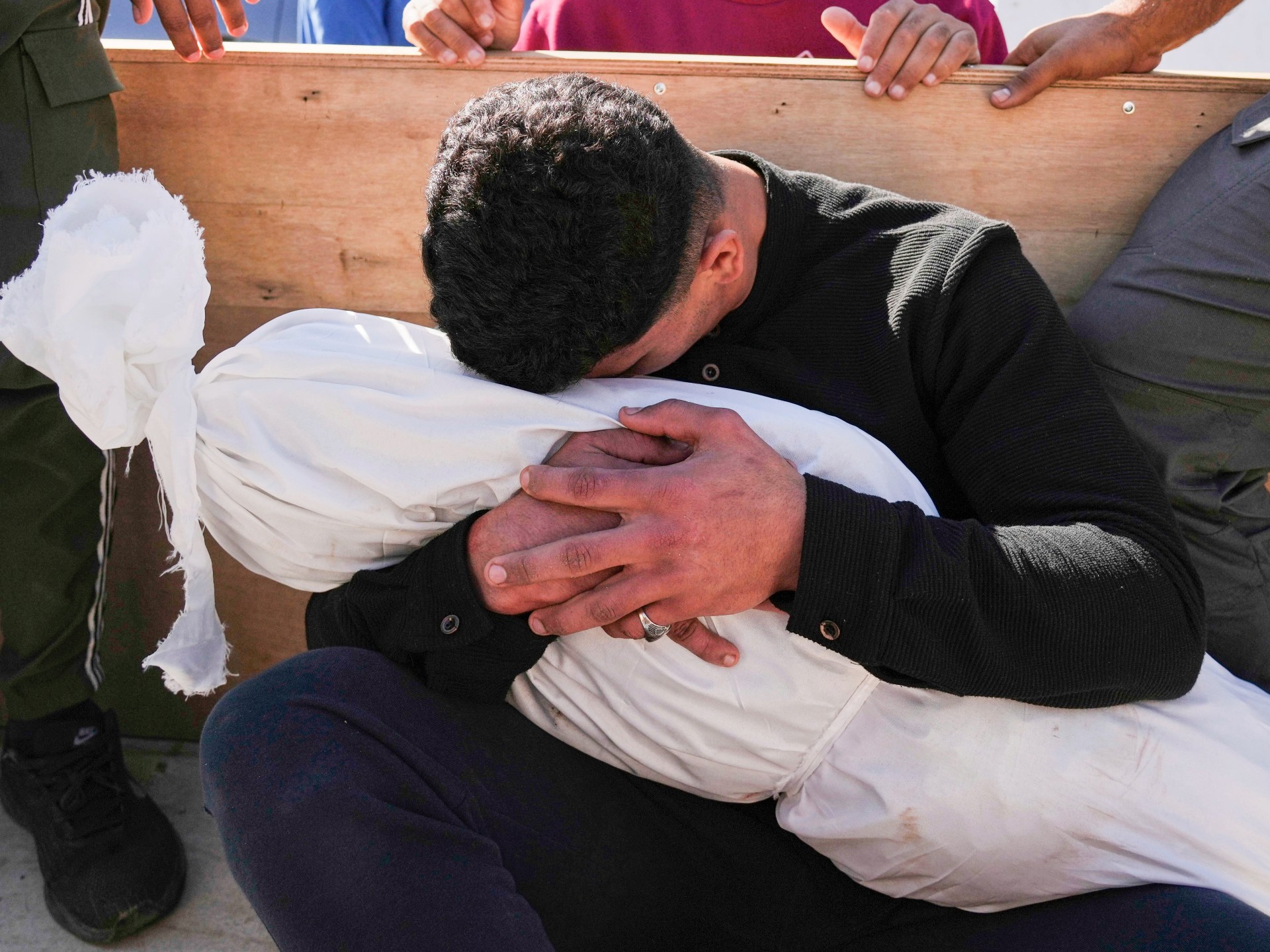
A strike targeting al-Karama School in the Tuffah neighbourhood in Gaza City kills 13 people.
Israeli attacks on Gaza have killed at least 31 people as its more than two-month blockade of the besieged and bombarded enclave has caused acute food shortages, accelerating the starvation of the Palestinian population.
The Israeli attacks were scattered across Gaza on Wednesday, with 13 people killed in a strike targeting al-Karama School in the Tuffah neighbourhood in Gaza City.
Also in the north, another three people were killed and several were wounded in a strike on a house in Jabalia.
Eight people were also killed, a father, his children and cousins, including five in a strike on a home in Khan Younis city in the south.
Another three people were killed, including a child, after a tent shelter was hit in Deir el-Balah, the central Gaza Strip. A wife and husband were also killed when a house was hit in Bani Suheila village, east of the Strip.
The attacks come as Gaza’s civil defence agency said on Tuesday night that 31 people had been killed and dozens wounded after an Israeli attack on a school sheltering displaced people in the Bureij refugee camp in the central Strip.
![[Al Jazeera]](https://www.aljazeera.com/wp-content/uploads/2025/04/Interactive_Gaza_foodaid_timeline-1742987531-1744365779.webp?w=770&resize=770%2C963&quality=80)
The intensified attacks are compounded by an Israeli blockade on essential supplies since March 2, leaving the enclave deprived of fuel items and food, including a worsening shortage of flour. Aid groups have said food supplies are close to total depletion.
A mother of six sheltering at a United Nations agency for Palestinian refugees (UNRWA) facility in Gaza told the agency they had run out of all types of food, with only bread available.
“The State of Israel must lift the siege,” UNRWA wrote on X on Wednesday.
“There must be a concerted international effort to stop this humanitarian catastrophe from reaching a new unseen level,” it added.
Gaza’s health sector is also facing the brunt of the ongoing attacks and the blockade, with at least 88 percent of beds in hospitals occupied and a shortage of medical disposables.
Ceasefire talks
On Wednesday morning, Egypt and Qatar, who both mediated the first ceasefire deal alongside the United States, reaffirmed their commitment to an agreement aimed at ending the “unprecedented humanitarian crisis and alleviating the suffering of civilians by fostering the necessary conditions for achieving a comprehensive ceasefire”.
“The two countries emphasise that attempts to sow discord among brotherly nations – whether through the casting of doubt, distortion, or media escalation – will not succeed, nor will they deter the two nations from continuing their joint efforts to end the war and the resulting humanitarian catastrophe,” a joint statement read, adding that the countries were working alongside the US to reach a deal.
While Israel announced that a new, more intense military offensive would begin in Gaza unless a ceasefire deal was signed, Hamas said talks were pointless.
“There is no sense in engaging in talks or considering new ceasefire proposals as long as the hunger war and extermination war continue in the Gaza Strip,” Hamas official Basem Naim told the AFP news agency on Tuesday.
Middle East
What does the truce between the Houthis and the US mean for Yemenis? | Houthis
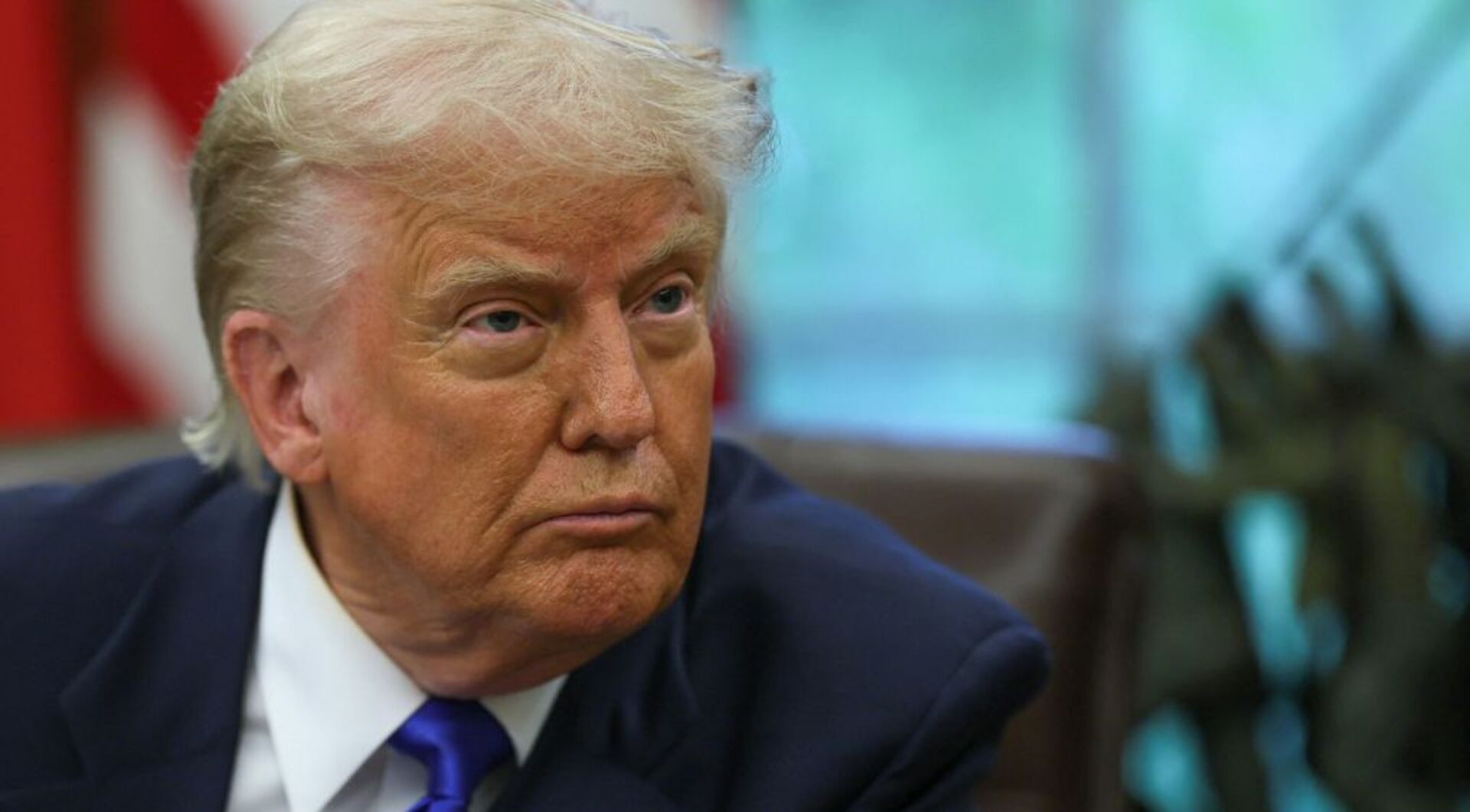
The United States and the Houthis have agreed to a ceasefire.
The Houthis, who control large areas of Yemen, began attacking Israel and commercial shipping and some US navy vessels in the Red Sea after Israel launched its war on Gaza in October 2023.
In response to Houthi attacks on shipping lanes, the US carried out attacks on the Iran-aligned group in Yemen.
Under the truce deal mediated by Oman, the US will halt its strikes on Houthi sites, and the Yemeni group will stop attacking US ships.
But the agreement does not include a truce in the conflict between Israel and the Houthis.
So, will Israel also stop its attacks? What does this all mean for the acute humanitarian crisis facing Yemenis?
Presenter: James Bays
Guests:
Maysaa Shuja al-Deen – Senior researcher, Sana’a Center for Strategic Studies
Ahmed al-Ashwal – Political and military analyst
Nabeel Khoury – Former US diplomat and former US deputy chief of mission to Yemen
Middle East
Syria’s al-Sharaa confirms indirect talks with Israel amid soaring tensions | Politics News
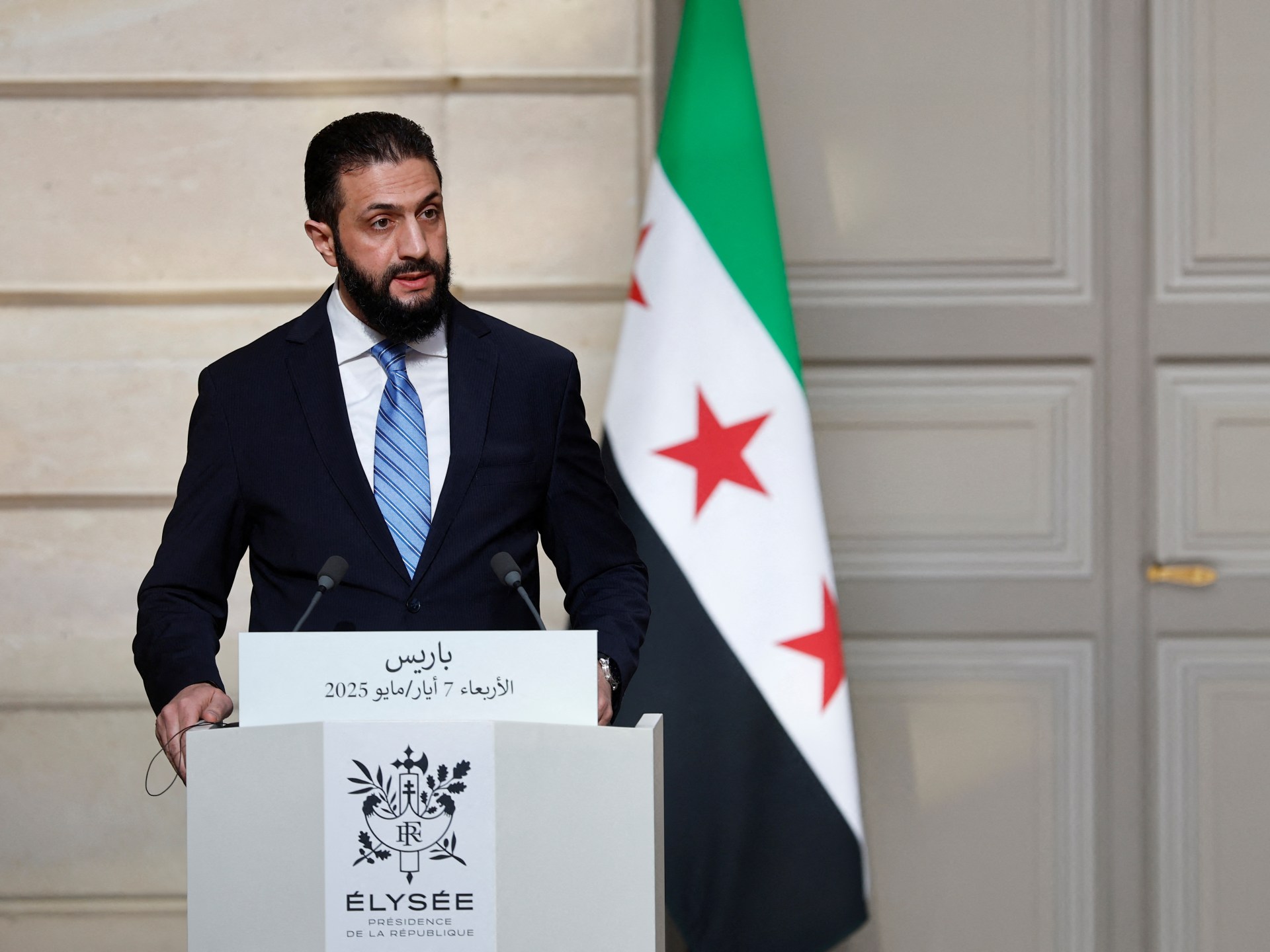
Interim President Ahmed al-Sharaa says Syria holding indirect talks with Israel ‘through mediators’.
Syrian’s interim President Ahmed al-Sharaa says his government has engaged in indirect talks with Israel in an attempt to ease escalating tensions between the two nations.
The announcement comes after an escalation in Israeli attacks on Syria last week, including a strike that landed just 500 metres (1,640 feet) from the presidential palace in Damascus on Friday.
Israel claimed its most recent air strikes were a response to what it described as threats to the country’s minority Druze community.
“There are indirect talks with Israel through mediators to calm and attempt to absorb the situation so that it does not reach a level that both sides lose control over,” al-Sharaa said, reiterating blame on Israel over what he described as its “random interventions” in Syria.
He also said Damascus was talking to states that communicate with Israel to “pressure them to stop intervening in Syrian affairs and bomb some of its infrastructure.”
There was no immediate comment from Israeli authorities.

Al-Sharaa’s remarks come during a landmark visit to Paris, his first trip to a European country since assuming office after he led opposition fighters in a lightning offensive that toppled longtime ruler Bashar al-Assad in December.
The visit required a special exemption from the United Nations, as al-Sharaa remains under international sanctions due to his previous role as leader of the armed group Hayat Tahrir al-Sham (HTS), a former al-Qaeda affiliate.
Lifting sanctions
Speaking in Paris after meeting President Emmanuel Macron at the Elysee Palace, al-Sharaa called for the lifting of economic restrictions on Syria, stating: “Nothing justifies maintaining sanctions imposed on the previous regimes.”
President Macron said France would consider gradually lifting European Union sanctions if Syria continued along its current path.
“I told the president that if he continues on his path, we would do the same, namely by first progressively lifting European sanctions, and then we would also lobby our American partners to follow suit on this matter,” Macron said.
The European Union has already lifted some restrictions, while other measures targeting individuals and entities are set to expire on 1 June. Sanctions relief in sectors such as oil, gas, electricity and transport remain crucial for Syria, where the World Bank estimates reconstruction of the country could cost more than $250bn.
Despite some easing of sanctions by European countries, the Trump administration has been more reserved in its approach to the new Syrian administration.
Macron revealed that he is urging the United States to delay its planned military withdrawal from Syria, arguing that lifting sanctions should be prioritised as a step towards ensuring long-term stability.
Al Jazeera’s Natacha Butler, reporting from Paris, said, “In return, Macron expects Syria’s new government to protect minorities, ensure stability and crack down on what he called terrorist organisations, including ISIS.”
“Sharaa is here to project a reassuring image to France’s Western allies, who have been a little bit wary and are looking to see what direction the new leadership takes,” Butler added.
Middle East
Libyan authorities reject report they will take in US deportees | Donald Trump News
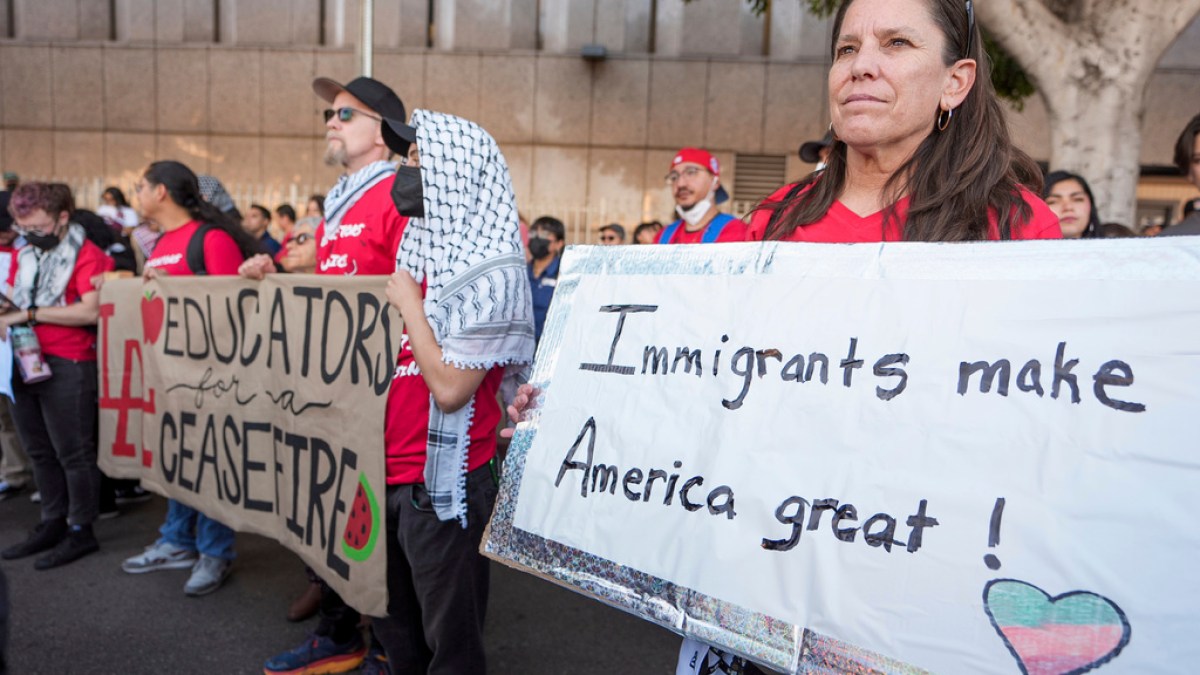
The Trump administration has sought agreements allowing it to send immigrants to third countries for detention.
IAuthorities in Libya, a country still divided after years of civil war, have denied reports that they will receive undocumented migrants deported by the United States.
The Reuters news agency reported on Wednesday that deportation flights from the US to the North African country could begin this week, despite previous government reports raising alarm over unsafe conditions there.
The National Unity government, which controls western Libya, said in a statement that it rejected the use of its territory as a destination for deporting migrants without its knowledge or consent.
“The Government of National Unity categorically denies any agreement or coordination with US authorities regarding the deportation of migrants to Libya,” it said in a statement.
Haftar’s Libyan National Army, which controls eastern Libya, also rejected the report, saying that migrants “will not be received through airports and ports secured by the Armed Forces, and that this is completely false and we cannot accept it at all.”
The report by Reuters, which cites three anonymous US officials, says that the US military could fly migrants to Libya for detention as soon as Wednesday, but notes that those plans are subject to change. The number and nationality of the migrants who could be deported are unknown.
The administration of US President Donald Trump has sought out third countries where it can deport and detain undocumented immigrants, part of a larger push to enact the administration’s hard-right vision of immigration enforcement.
And on April 30, Secretary of State Marco Rubio announced at a cabinet meeting at the White House that the US was requesting that countries take its undocumented migrants.
“We are working with other countries to say: We want to send you some of the most despicable human beings, will you do this as a favour to us?” Rubio said. “And the further away from America, the better.”
‘Extortion, forced labour and unlawful killings’
Authorities in Libya have long been willing and controversial partners in immigration enforcement, collaborating with the European Union to intercept and detain migrants and refugees attempting to cross the Mediterranean to reach Europe.
A 2022 statement from the human rights watchdog Amnesty International says that “men, women and children returned to Libya face arbitrary detention, torture, cruel and inhuman detention conditions, rape and sexual violence, extortion, forced labour and unlawful killings”.
The US government itself has also documented unsafe conditions in Libya, with a report released last year by the Department of State noting “harsh and life-threatening prison conditions” and “arbitrary arrest and detention”.
Such conditions have not deterred the Trump administration from sending undocumented immigrants to prisons known for abusive conditions in countries like El Salvador, sometimes based on unsubstantiated allegations of gang affiliation and without due process.
The practice of third countries entering into agreements with Western nations to warehouse undocumented migrants and asylum seekers is also not entirely new.
Earlier this week, Rwanda also stated that it was discussing the possibility of receiving undocumented immigrants from the US. The Rwandan government has also previously entered into an agreement with the United Kingdom to hold asylum seekers while their claims were processed in the UK, although that deal ultimately stalled out when faced with backlash and legal challenges.
-

 Sports2 days ago
Sports2 days agoBaltimore Ravens release veteran kicker Justin Tucker, calling it a ‘football decision’
-

 Europe2 days ago
Europe2 days agoUkrainian drones attack Moscow, halting flights ahead of major military parade
-

 Sports2 days ago
Sports2 days agoZhao Xintong becomes China’s first world snooker champion after comeback from ban
-

 Middle East2 days ago
Middle East2 days agoExplosions, huge fire in Sudanese city of Port Sudan | Sudan war News
-

 Lifestyle2 days ago
Lifestyle2 days agoOne Tech Tip: Skype shut down for good, but users still have these alternatives
-
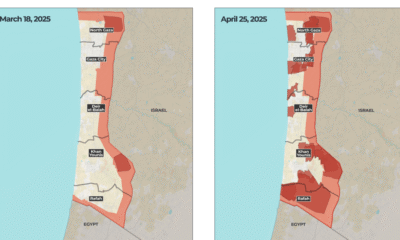
 Middle East2 days ago
Middle East2 days agoIsrael has turned 70% of Gaza into no-go zones, in maps | Israel-Palestine conflict News
-

 Sports2 days ago
Sports2 days agoLindsey Vonn says she proved to herself and her doubters that ‘I deserve to be here’ after skiing return
-
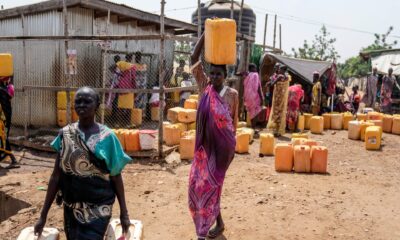
 Conflict Zones2 days ago
Conflict Zones2 days ago‘We are suffering’: Displaced families bear burden of South Sudan conflict | Humanitarian Crises News




